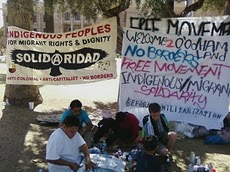 Southern Border Indigenous Peoples Roundtable Symposium
Southern Border Indigenous Peoples Roundtable SymposiumEarthcycles and Censored News will broadcast live!
Thursday, November 18 · 3:00 pm - 6:00 pm
YWCA Frances McClelland Leadership Center
525 N. Bonita Ave Tucson, Arizona
Photo: San Xavier, remembering the migrants/Photo by Brenda NorrellThursday, November 18 · 3:00 pm - 6:00 pm
YWCA Frances McClelland Leadership Center
525 N. Bonita Ave Tucson, Arizona
By Alianza Indigena sin Fronteras/Indigenous Alliance without Borders
For over a decade the Indigenous Alliance Without Borders has worked to be an international voice for traditional southern borderland indigenous peoples. The Indigenous Alliance promotes respect for indigenous rights, border rites of passage and recognition of our indigenous relative’s cultural affiliation with Southern Border Indigenous Nations from California, Arizona and Texas. To ease border crossings for all indigenous peoples residing in Mexico to attend ceremonies, social events and visit family.
Why a Roundtable Border Symposium?
For more than two centuries indigenous peoples have inhabited the southern border long before the establishment of the U.S. and Mexico Nations. Indigenous peoples have been impacted by policies set in the far off capitals of these two nations, but have continued to maintained their cultures and social networks despite these bad government policies indigenous peoples continue to maintain their way of life and address their every day needs; We have continued to maintain our ancient indigenous cultures and social networks within our traditional homelands now divided by the U.S. – Mexico international boundary.
Since 1990, our Indigenous brothers and sisters have been faced with legislation and restrictive border enforcement policies, militarization/border wall, heavy migrant and undocumented traffic, environmental destruction of indigenous borderlands, ceremonial grounds, and sacred sites. We need to educate and inform the general community on border indigenous concerns affecting the southern border indigenous peoples
Round Table Discussion:
•Recent Changes to U.S. Immigration & Border Policies could erode or affirm indigenous peoples rights to maintain their cultural connections across the U.S. – Mexico border;
•Western Hemisphere Travel Initiative does not apply to Indigenous Mexican nationals who are culturally affiliated by blood relative, language, ceremonies and traditions
•Affects of Racism and negative political climate in Arizona on indigenous communities
•Potential Regulatory Solutions and Strategies to promote Southern Indigenous Rights and Justice.
Why a Roundtable Border Symposium?
For more than two centuries indigenous peoples have inhabited the southern border long before the establishment of the U.S. and Mexico Nations. Indigenous peoples have been impacted by policies set in the far off capitals of these two nations, but have continued to maintained their cultures and social networks despite these bad government policies indigenous peoples continue to maintain their way of life and address their every day needs; We have continued to maintain our ancient indigenous cultures and social networks within our traditional homelands now divided by the U.S. – Mexico international boundary.
Since 1990, our Indigenous brothers and sisters have been faced with legislation and restrictive border enforcement policies, militarization/border wall, heavy migrant and undocumented traffic, environmental destruction of indigenous borderlands, ceremonial grounds, and sacred sites. We need to educate and inform the general community on border indigenous concerns affecting the southern border indigenous peoples
Round Table Discussion:
•Recent Changes to U.S. Immigration & Border Policies could erode or affirm indigenous peoples rights to maintain their cultural connections across the U.S. – Mexico border;
•Western Hemisphere Travel Initiative does not apply to Indigenous Mexican nationals who are culturally affiliated by blood relative, language, ceremonies and traditions
•Affects of Racism and negative political climate in Arizona on indigenous communities
•Potential Regulatory Solutions and Strategies to promote Southern Indigenous Rights and Justice.





































.jpg)






























































.jpg)


























